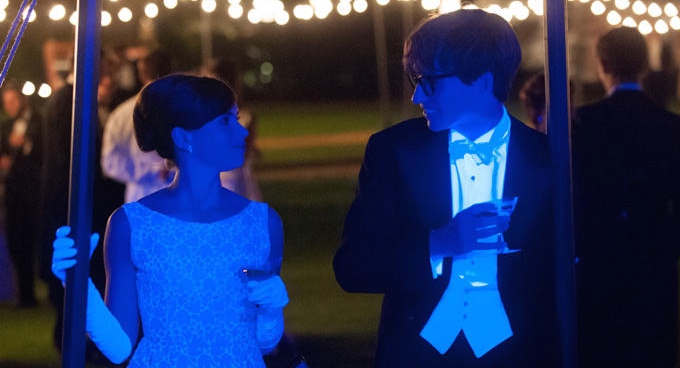Film review of the romantic biographical drama about the physicist Professor Stephen Hawking and his first wife Jane, starring Eddie Redmayne and Felicity Jones.
Director: James Marsh. Working Title Films/Universal. 12(a).
Romance

Cast & credits
Producers: Tim Bevan, Lisa Bruce, Eric Fellner, Anthony McCarten.
Writer: Anthony McCarten.
Camera: Benoît Delhomme.
Music: Johann Johannsson.
Sets: John Paul Kelly.
Eddie Redmayne, Felicity Jones, Charlie Cox, Maxine Peake, Harry Lloyd, Emily Watson, Simon McBurney, David Thewlis, Christian McKay.
Synopsis
Whilst studying at Cambridge, physics student Stephen Hawking (Redmayne) starts to suffer problems with his movement and is diagnosed as having motor neurone disease. Despite this, he continues his studies, developing into a genius whose theories about black holes and the nature of time and space capture the attention of not only academics but the whole world. As his celebrity grows, his condition claims more and more of physical movements and speech and place an increasing strain on his young wife Jane (Jones).
Review
I’m not usually affected by films on an emotional level. Call me a cinematic hard nut if you will, but it takes a lot to make me whimper, wail or weep after watching a movie.
True, there were moments in MGM’s Lassie Come Home (1943) that created what could be called proto-tears, but I was about eight when I saw it. And that dog went through a lot to meet up with Roddy McDowell.
Sure I have physical reactions to movies. I’m agitated at watching suspense films, shocked by horror films and tingled all over after seeing the spruced up print of Metropolis (1926) in London when the New Babelsburg Orchestra were flown in for one night to play the new, soaring score, but I’m never emotionally moved by films.
The Theory Of Everything bucks that trend for me. An involving and wrenching film, I can admit to having at least three tears well up in my eyes, before being quickly erased with a tissue.
film, I can admit to having at least three tears well up in my eyes, before being quickly erased with a tissue.
Director Marsh and cameraman Delhomme’s choice of awesomely huge close-ups throughout the film almost overwhelm the viewer, complementing the vastness of the universe Hawking studies. They serve not only to enlarge the passion and devotion between Stephen and Jane, but also jolt the audience into wincing at the invasive and uncomfortable treatments Hawking has undergone, scalpels slicing skin, needles into his back during a lumbar puncture. Pleasure and the pain are expanded on the big screen with unsparing equality.
That love is beautifully portrayed by Redmayne and Jones, both of whom have just been nominated for Best Acing awards at the BAFTA’s and will surely lead the way at other awards ceremonies in 2015.
What is most noticeable is the mirroring in their earliest scenes, duplicating each others eye movements, lip positions and how they show their teeth when they smile.
Redmayne must have suffered physically during the later scenes when Hawking is confined to a wheelchair. This aids his knockout performance in terms of accuracy but must have pummelled his muscles and joints as he nailed Hawking’s confinement, postures, walking and even his disintegrating voice. He spent six months researching and watching footage of Hawking and the results show as Hawking’s humanity and ripe sense of humour and self-deprecation are never lost. This is not a film about a disability but about a life lived to the full and the great achievements one can make in spite of an infirmity.
It’s an odd thing to say that such a film could be funny, but there are hilarious, laugh-out-loud moments throughout. Relief for an audience between the deadly serious and upsetting scenes perhaps, but absolutely indicative of Hawking’s own self-deprecation and mischievious sense of humour (his best friend Lloyd places him in the arms of a statue of Queen Victoria, he dresses up as a Dalek from Doctor Who and wheels around his house when his new voice synthesiser is installed). Again, this is an account of a whole life and experiences, not just the bad times.
Jones, noteworthy for playing a Chalet Girl and starring in Like Love (both 2011) should hit the big time with this film. Far from being outshone by Redmayne in the more showy role she rises to the challenge set by him and gives a determined performance as an initially perky and pretty girly who grows into a woman of fortitude, practicality and forbearance. In her hands, Jane Hawking is not a suffering wife, but a strong one whose own affliction is the human frailty of being worn out by devotion.
Jane discovers new love in that hot bed of licentiousness and lust the English church choir, with equally perky and pretty Cox as the choir master with the mostest. This could have been a thankless role, the ‘other man’ whom she doesn’t play away with, but Cox is delicately tortured by his own feelings. Peake rounds off the superb acting as Hawking’s second wife a comely, no-nonsense therapist who merrily crosses the boundaries of professional behaviour.
My only issue with the film is that I felt let-down by its sense of cinema. Yes, there are those incredible, punchy close-ups and Hawking discovering the colour and form of black holes when his eyes rest on the home fire leads to some great but all too brief visuals, but where is the cinematic ‘big bang’?
Hawking deals in time, space, life, the cosmos and everything, is this not enough to conjure up some flash, bang and wallop? Instead, the film ambles along at a sedate pace, brilliant for an intimate romance, but it does less filmic justice than it could for the man whose theories and lectures have transfixed an entire planet for generations.


3 thoughts on “The Theory Of Everything (2014)”